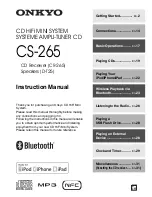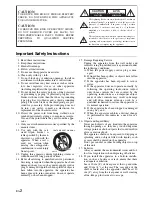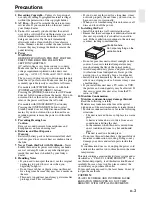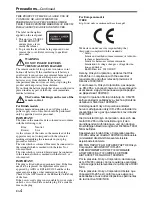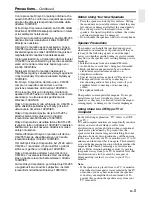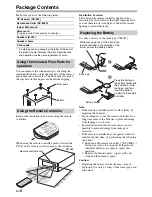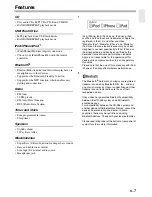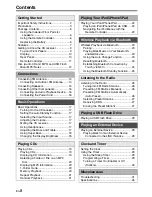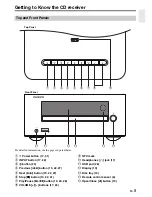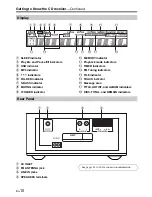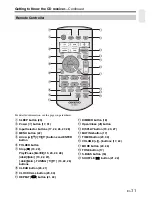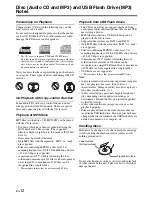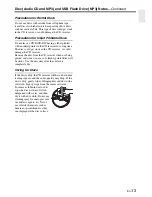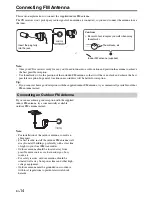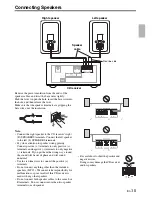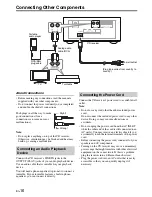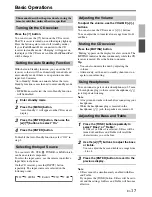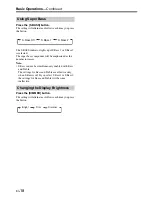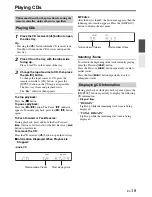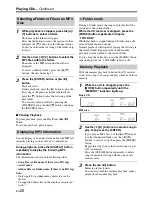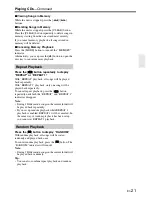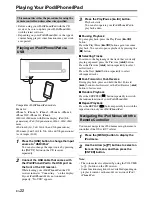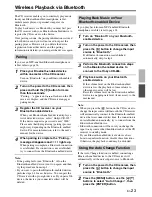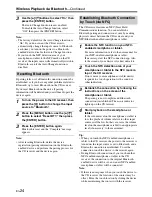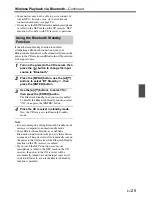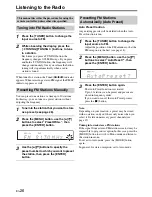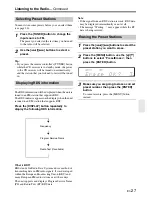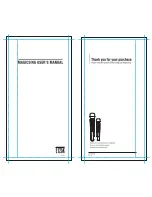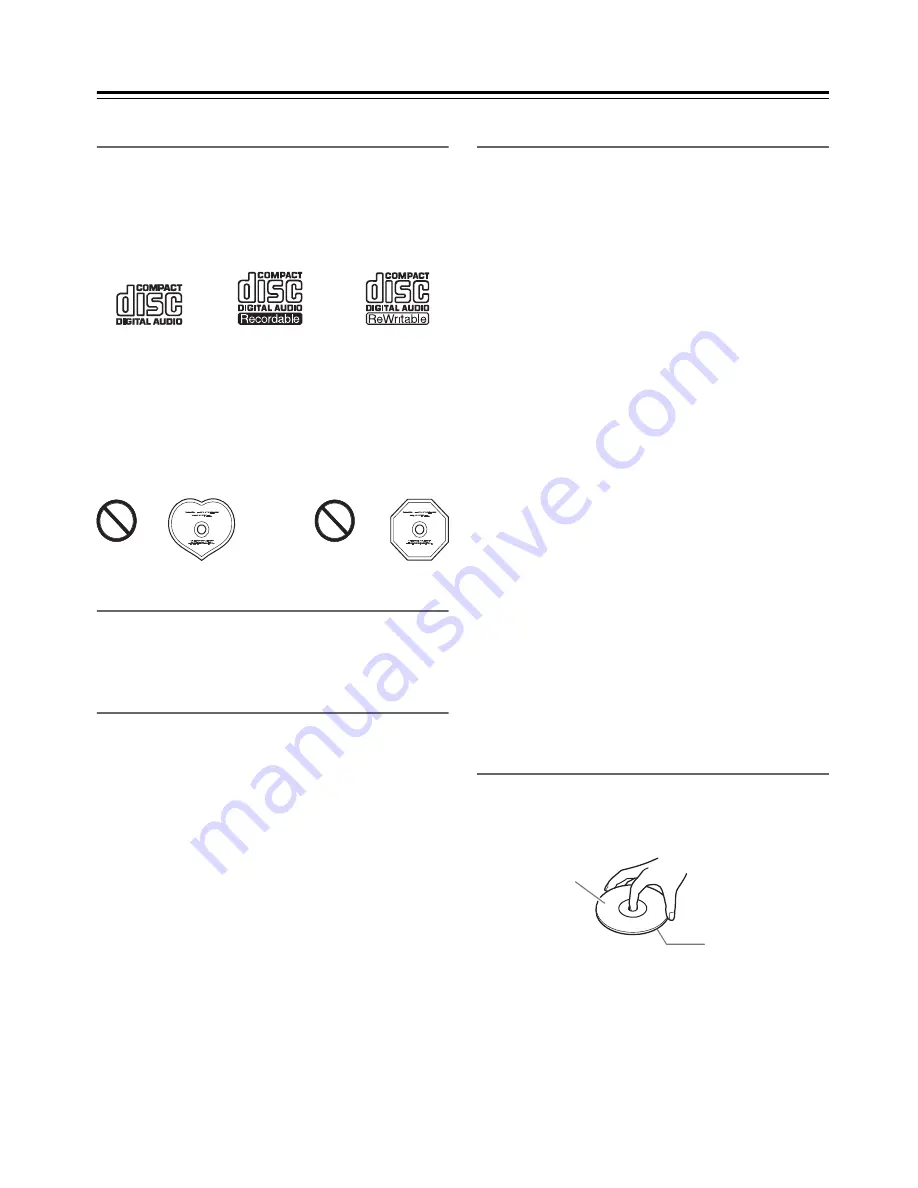
En-
12
Disc (Audio CD and MP3) and USB Flash Drive (MP3)
Notes
Precautions for Playback
Compact discs (CDs) with the following logo on the
label surface can be used.
Do not use discs designed for purposes other than audio,
such as CD-ROMs for PC use. Abnormal noise could
damage the CD receiver and/or speakers.
*
The CD receiver supports CD-R and CD-RW discs.
Note that some discs may not playback because of the disc
characteristics, scratches, contamination or the recording
state. A disc recorded with an audio CD recorder will not
playback unless it is finalized.
Never use discs that have a special shape (such as hearts
or octagons). These types of discs could damage the CD
receiver.
CD Playback with Copy-control Function
Some audio CDs with copy-control function do not
comply with official CD standards. These are special
discs and cannot be played with the CD receiver.
Playback of MP3 Discs
MP3 files recorded on a CD-R/CD-RW can be played
with the CD receiver.
• Use discs which have been recorded following the
ISO 9660 Level 2 file system. (The supported
directory depth is eight levels, the same as ISO 9660
Level 1)
• Discs must be closed (finalized).
• Only MP3 files with the extension “.MP3” or “. mp3”
are supported.
• Files recorded using MPEG 1 audio layer 3 at
sampling frequencies of 32/44.1/48 kHz and a bit rate
of 32–320 kbps are supported.
• A maximum of 255* folders (including the root
folder) and a maximum of 512 files can be recognized
on a single CD. A maximum of 512 files can be
recognized in a single folder.
* This includes folders that do not contain MP3 files.
Playback from USB Flash Drives
• The CD receiver does not support playback from
audio player units and smartphones that are not USB
mass storage devices.
• MP3 files recorded on a USB flash drive can be
played with the CD receiver.
• Supported file systems are FAT16 and FAT32.
• Only MP3 files with the extension “.MP3” or “.mp3”
are supported.
• Files recorded using MPEG 1 audio layer 3 at
sampling frequencies of 32/44.1/48 kHz and a bit rate
of 32–320 kbps are supported.
• A maximum of 999* folders (including the root
folder) and a maximum of 3000 files can be
recognized on a single USB flash drive. A maximum
of 999 files can be recognized in a single folder.
• USB hubs are not supported.
* This includes folders that do not contain MP3 files.
Note:
• A disc recorded with a recorder or personal computer
may not play in some cases. (Cause: Disc’s
characteristics, damaged or dirty disc, dirt on player’s
lens, dew condensation, etc.)
• A disc recorded on a personal computer might not
play depending on the application settings or
environment. Record the disc in a format supported
by the CD receiver.
• A disc with insufficient storage capacity may not
playback properly.
• Files are played back in the same order as they are
saved in the USB flash drive. However, playback may
change if the files or folders in the USB flash drive are
deleted or renamed on a computer, etc.
Handling Discs
Hold discs by the edge, or by the center hole and edge.
Avoid touching the playback surface (surface with
nothing printed on it).
Do not attach paper or stickers, or write on the playback
or label surface of the disc. Take care not to scratch or
damage the disc.
*
*
Label surface
(printed surface)
Playback surface
Summary of Contents for CS-265
Page 2: ......
Page 38: ...En 36 Memo ...
Page 74: ...Fr 36 Memo ...
Page 110: ...Es 36 Memo ...
Page 146: ...It 36 Memo ...
Page 182: ...De 36 Memo ...
Page 218: ...Nl 36 Memo ...
Page 254: ...Sv 36 Memo ...
Page 255: ......



